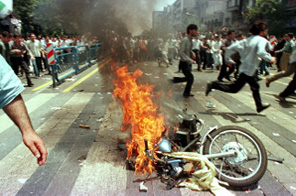Iran issues warning on demos
TEHRAN: Iran authorities, still reeling from the massive public protests over last month's election, warned on Thursday of a harsh crackdown against any demonstration to mark the anniversary of student unrest which rocked the Islamic republic on this day in 1999.
The warning was issued after the G8 world powers expressed "serious concern" over the violence unleashed after the hotly-disputed re-election of hardline President Mahmoud Ahmadinejad which left at least 20 people dead.
Iranian authorities have banned all kinds of gatherings amid a fierce crackdown on protestors, reformists, journalists and political activists after the election crisis which shook the pillars of the Islamic republic.
However, witnesses said leaflets were being distributed in several Tehran squares urging people to join a march on Thursday to mark the 10th anniversary of student protests which were violently suppressed by the authorities.
"No permission for a gathering or march has been requested or issued," Tehran governor Morteza Tamadon said in a strongly worded statement to the official news agency IRNA.
"But if some people make moves that are contrary to security initiatives under the influence of anti-revolutionary networks, they will be trampled under the feet of our alert people." Groups of students hold small gatherings each year to commemorate July 9, 1999, which marks the most significant confrontation between the authorities and students in the Islamic republic.
The riots were sparked when hardline vigilantes stormed student dormitories and the ensuing violence left at least one student dead and dozens wounded, according to official figures.
But in the biggest upheaval since the 1979 Islamic revolution, hundreds of thousands of people poured on to the streets of Tehran last month to oppose Ahmadinejad's June 12 election win, which his rivals say was rigged.
The ensuing crackdown by security forces and volunteer Basij militia enraged the global community which is already at loggerheads with Tehran over its controversial nuclear drive.
Ahmadinehad, who set Iran on a collision course with the West on the nuclear programme and anti-Israeli outbursts, has repeatedly insisted his election was fair despite allegations of widespread irregularities.
At a summit in Italy on Wednesday, the G8 issued a declaration expressing concern over the post-election violence but said they were determined to find a peaceful resolution to the nuclear standoff.
"G8 countries continued to be seriously concerned about recent events in Iran," it said. "Interference with media, unjustified detentions of journalists and recent arrests of foreign nationals are unacceptable." Iran has repeatedly accused the West of meddling in its affairs, taking a particularly harsh line against Britain. It is still holding one of nine local British embassy employees arrested for stoking the unrest in the capital.
French officials also say a French woman lecturer is being detained in Tehran's notorious Evin prison on charges of spying for taking part in similar anti-election protests in the historic city of Isfahan.
French President Nicolas Sarkozy has dismissed the espionage allegations against Clotilde Reiss and called for her immediate release. Iranian officials have still not confirmed her detention.
The G8 also urged Tehran to engage in dialogue with the International Atomic Energy Agency, the UN nuclear watchdog.
"We strongly urge Iran to cooperate with the IAEA and comply with relevant Security Council resolutions without further delay." Global powers suspect Iran's nuclear drive is aimed at making atomic weapons, but Tehran denies these charges although it has refused to halt uranium enrichment despite three sets of UN sanctions.
"The discussion reflected, I'd say, a collective impatience with Iran and a desire to see real response going forward," US Deputy National Security Adviser Michael Froman told reporters.






